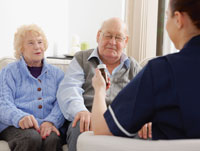
Social care professionals have been urged to become more aware of the needs of older carers after a survey found two-thirds had long-term health problems and half said their physical health had got worse in the last year.
Carers aged over 60 were “overwhelmingly exhausted and worried”, with most doing at least 60 hours a week of caring, found the survey by the Princess Royal Trust for Carers.
Among key findings were that one-third of older carers had cancelled treatment or an operation they needed due to their caring responsibilities, while four in 10 said their mental health had deteriorated in the past year.
More than eight out of 10 older carers had worries about what would happen to the person they cared for if they could no longer provide care.
“With an ageing population ever more people will take on a caring role in their retirement,” said the report. “Being a carer means they should not be expected to give up their health, wellbeing or aspirations. Government, health and care services, professionals, and wider society as a whole needs to recognise the role older carers play and offer greater support.”
It said this highlighted the need for easily accessible, comparatively low-cost preventative services at local level.
Older people’s social worker Pam Stopforth, dementia development co-ordinator at Liverpool charity PSS, said professionals needed to be aware of the value of giving carers time for themselves and of the value of listening and having a conversation with them.
She said a particular problem is carers are frequently not given enough information or are not signposted to the right service so do not even know, for example, that they are eligible for a carers’ assessment.
Stopforth said: “The big frustration and tension for most organisations is getting communication right. If people are given information and have access to it, that can keep them positive because they can see what can be done,” she said.
As a result, she now advocates the use of a befriending service whereby someone is always at the other end of a phone for older people on their own. Such a service is promoted by PSS and Liverpool Hope University for dementia care and potentially could be extended to other areas, she said.
What do you think? Join the debate on CareSpace
Keep up to date with the latest developments in social care. Sign up to our daily and weekly emails
Related stories


 A trauma-informed approach to social work: practice tips
A trauma-informed approach to social work: practice tips  Problem gambling: how to recognise the warning signs
Problem gambling: how to recognise the warning signs 




 Find out how to develop your emotional resilience with our free downloadable guide
Find out how to develop your emotional resilience with our free downloadable guide  Develop your social work career with Community Care’s Careers and Training Guide
Develop your social work career with Community Care’s Careers and Training Guide  ‘Dear Sajid Javid: please end the inappropriate detention of autistic people and those with learning disabilities’
‘Dear Sajid Javid: please end the inappropriate detention of autistic people and those with learning disabilities’ Ofsted calls for power to scrutinise children’s home groups
Ofsted calls for power to scrutinise children’s home groups Seven in eight commissioners paying below ‘minimum rate for home care’
Seven in eight commissioners paying below ‘minimum rate for home care’
 Facebook
Facebook X
X LinkedIn
LinkedIn Instagram
Instagram
Comments are closed.